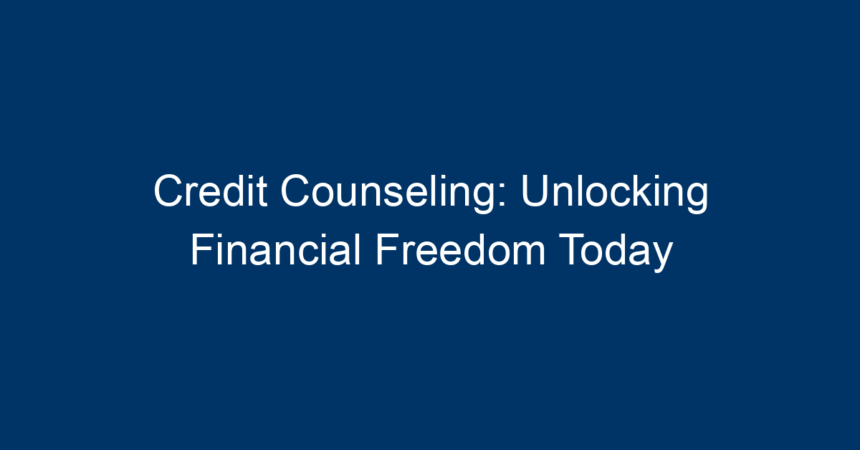Managing finances can often feel overwhelming, particularly with mounting debts and unexpected expenses. In today’s fast-paced world, many individuals find themselves in financial distress, struggling to make ends meet. Fortunately, credit counseling offers a pathway to understanding and improving your financial situation. By providing the tools, resources, and personalized support necessary to regain control, credit counseling can be your key to unlocking financial freedom today.
What is Credit Counseling?
Credit counseling is a service that helps individuals understand and manage their debt and financial obligations. It involves working with a certified credit counselor who assesses your financial situation, provides education on budgeting, and suggests strategies for debt repayment. The objective is to empower you with the knowledge and skills necessary to make informed financial decisions.
The Importance of Credit Counseling
In a society where consumer debt is at an all-time high, credit counseling has become increasingly vital. According to recent statistics, nearly 80% of Americans are in some form of debt, whether from student loans, credit cards, or mortgages. This debt can lead to stress, anxiety, and a sense of hopelessness, but credit counseling can help break that cycle.
- Gaining Financial Awareness: Credit counselors help clients understand their financial habits and the importance of budgeting.
- Debt Management Solutions: A professional counselor can provide tailored plans for reducing and managing debt.
- Emotional Support: The psychological toll of financial struggles should not be underestimated. Counselors offer support and guidance, helping you regain control over your financial life.
How Credit Counseling Works
Step 1: Initial Consultation
The first step in credit counseling is an initial consultation. During this session, your counselor will review your financial situation, including income, expenses, debts, and credit history. This information will help them design a personalized plan to assist you.
Step 2: Budgeting and Financial Planning
Once your financial situation is assessed, your counselor will work with you to develop a realistic budget. This budget will track your income and expenses, helping to identify areas where you can cut costs and save money.
Step 3: Debt Management Plans (DMP)
If necessary, counselors may recommend enrolling in a Debt Management Plan (DMP). This structured plan allows you to make a single monthly payment to the credit counseling agency, which then distributes the funds to your creditors. DMPs can often reduce interest rates or eliminate late fees, making it easier to pay down debt.
Step 4: Ongoing Support and Education
Credit counseling is not just a one-time service. Counselors provide ongoing support and financial education, ensuring that clients stay on track with their plans. Regular check-ins can help adapt your budget and debt repayment strategies as necessary.
Benefits of Credit Counseling
1. Improved Credit Score
One of the long-term benefits of credit counseling is an improvement in your credit score. By managing debt more effectively and making timely payments, your credit score can increase, opening new doors to financial opportunities.
2. Lower Stress Levels
Financial uncertainty can lead to heightened stress and anxiety. Credit counseling offers a structured approach to managing your debt, helping reduce the mental burden associated with financial issues.
3. Tools for Future Financial Success
Through credit counseling, you gain valuable skills and knowledge that can benefit you long after you’ve resolved current financial challenges. Understanding budgeting, saving strategies, and debt management can lead to healthier financial habits in the future.
Choosing the Right Credit Counseling Agency
Not all credit counseling agencies are created equal. Here are a few tips for selecting a credible agency:
1. Check for Accreditation
Choose an agency that is accredited by a recognized organization, such as the National Foundation for Credit Counseling (NFCC) or the Financial Counseling Association of America (FCAA). Accreditation ensures that the agency adheres to ethical standards and offers quality services.
2. Review Fees and Services
While many credit counseling agencies offer free initial consultations, be sure to ask about any fees associated with their services. Understand what is included in the costs and ensure there are no hidden fees.
3. Read Reviews and Testimonials
Do your research by reading online reviews and testimonials from previous clients. This can provide insight into the agency’s reputation and the effectiveness of their services.
4. Ask About Their Approach
Inquire about their counseling approach and the types of services offered. A good agency will prioritize personalized service tailored to your unique financial situation.
Common Misconceptions About Credit Counseling
Myth 1: Credit Counseling Will Hurt Your Credit Score
Many individuals believe that enrolling in a credit counseling program will negatively impact their credit score. In reality, seeking help from a credit counseling agency can actually improve your score over time by promoting better financial habits and debt repayment strategies.
Myth 2: Credit Counseling is Only for the Deeply In Debt
While credit counseling is particularly beneficial for those struggling with substantial debt, it can also help individuals who are merely seeking to improve their financial literacy and make smarter financial decisions.
Myth 3: All Credit Counseling Agencies Are the Same
As mentioned earlier, not all credit counseling agencies are reputable. Taking the time to research and select a well-rated agency ensures you receive quality support.
Actionable Insights for Achieving Financial Freedom
1. Start Budgeting Today
Regardless of your current financial status, creating a budget is essential. Track your income and expenses to understand where your money goes, and make adjustments to allocate funds for savings and debt repayment.
2. Educate Yourself
Invest time in educating yourself about personal finance topics. Websites, books, and workshops can provide valuable insights into budgeting, investing, and managing credit.
3. Seek Professional Help
If you feel overwhelmed, don’t hesitate to reach out for professional assistance. A certified credit counselor can provide guidance tailored to your needs.
4. Set Financial Goals
Establish both short-term and long-term financial goals. Whether it’s paying off a specific debt or saving for a major purchase, having clear objectives can motivate you to stay on track.
5. Monitor Your Progress
Regularly review your financial progress. Celebrate milestones, even small ones, to keep yourself motivated. Adjust your plans as necessary to ensure continued progress toward financial freedom.
Conclusion
Credit counseling is much more than just a service; it’s a lifeline for those seeking to regain control over their finances. By understanding your financial situation, learning to budget effectively, and creating a debt repayment strategy, you can unlock the door to financial freedom. Take the first step today—whether through seeking professional help or taking charge of your budgeting—because a brighter financial future is within your reach. Embrace the journey towards financial stability and empowerment through credit counseling.




